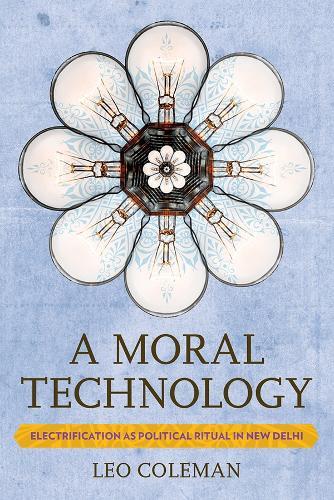Overview
In India over the past century, electrification has meant many things: it has been a colonial gift of modern technology, a tool of national integration and political communication, and a means of gauging the country's participation in globalization. Electric lights have marked out places of power, and massive infrastructures have been installed in hopes of realizing political promises. In A Moral Technology, the grids and wires of an urban public utility are revealed to be not only material goods but also objects of intense moral concern. Leo Coleman offers a distinctive anthropological approach to electrification in New Delhi as more than just an economic or industrial process, or a ""gridding"" of social and political relations. It may be understood instead as a ritual action that has formed modern urban communities and people's sense of citizenship, and structured debates over state power and political legitimacy. Coleman explores three historical and ethnographic case studies from the founding of New Delhi as an imperial capital city, to its reshaping as a national capital for post-independence India, up to its recent emergence as a contemporary global city. These case studies closely describe technological politics, rituals, and legal reforms at key moments of political change in India, and together they support Coleman's argument that ritual performances, moral judgments, and technological installations combine to shape modern state power, civic life, and political community.
Full Product Details
Author: Leo C. Coleman
Publisher: Cornell University Press
Imprint: Cornell University Press
Dimensions:
Width: 15.20cm
, Height: 2.50cm
, Length: 22.90cm
Weight: 0.907kg
ISBN: 9781501707513
ISBN 10: 1501707515
Pages: 256
Publication Date: 09 May 2017
Recommended Age: From 18 years
Audience:
General/trade
,
General
Format: Hardback
Publisher's Status: Active
Availability: Manufactured on demand

We will order this item for you from a manufactured on demand supplier.
Reviews
"""Developing nuanced and valuable readings of critical moments in the story of electrification in Delhi/New Delhi, Leo Coleman suggests that electricity far exceeds its formal role as infrastructure. He persuasively argues that the ideological burden and meaning of electricity informs its physical distribution (from where it is introduced and who gets it first to how the grid is controlled or the ownership of electric meters understood), while demonstrating how political associations, relationships, and networks are imagined, cast, and reconfigured through the distribution of electricity.""-Ritika Prasad, University of North Carolina-Charlotte, author of Tracks of Change: Railways and Everyday Life in Colonial India"
Developing nuanced and valuable readings of critical moments in the story of electrification in Delhi/New Delhi, Leo Coleman suggests that electricity far exceeds its formal role as infrastructure. He persuasively argues that the ideological burden and meaning of electricity informs its physical distribution (from where it is introduced and who gets it first to how the grid is controlled or the ownership of electric meters understood), while demonstrating how political associations, relationships, and networks are imagined, cast, and reconfigured through the distribution of electricity. -Ritika Prasad, University of North Carolina-Charlotte, author of Tracks of Change: Railways and Everyday Life in Colonial India
Author Information
Leo Coleman is Associate Professor of Anthropology at Hunter College, City University of New York. He is the editor of Food: Ethnographic Encounters.



